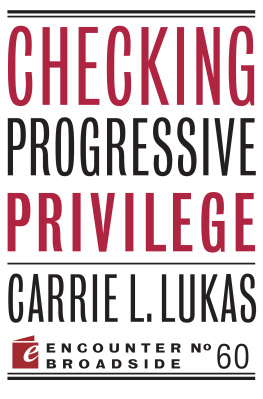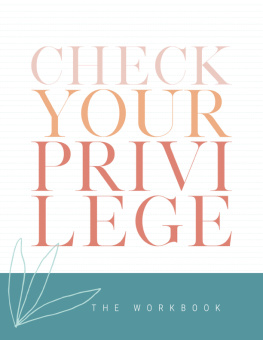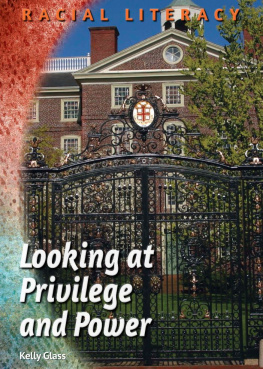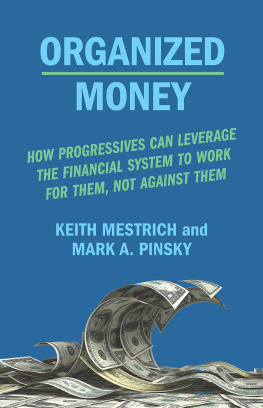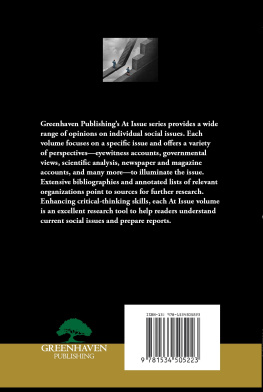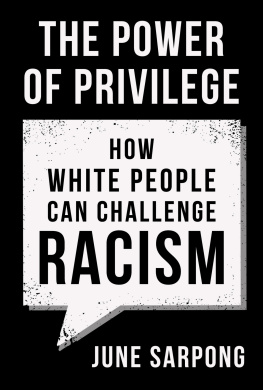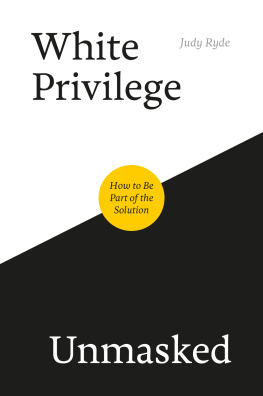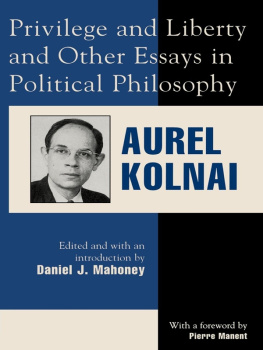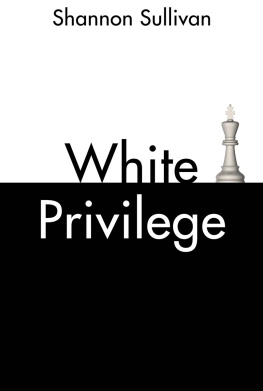
ENCOUNTER BROADSIDES
Inaugurated in the fall of 2009, Encounter Broadsides are a series of timely pamphlets and e-books from Encounter Books. Uniting an 18th century sense of public urgency and rhetorical wit (think The Federalist Papers, Common Sense) with 21st century technology and channels of distribution, Encounter Broadsides offer indispensable ammunition for intelligent debate on the critical issues of our time. Written with passion by some of our most authoritative authors, Encounter Broadsides make the case for ordered liberty and the institutions of democratic capitalism at a time when they are under siege from the resurgence of collectivist sentiment. Read them in a sitting and come away knowing the best we can hope for and the worst we must fear.

I NTRODUCTION
S OMETHING IS very wrong with our political culture today. Thats one of the few areas of agreement in this era of contentious and uncivil debate.
We need to restore a climate in which we can productively debate across the political divide and decide upon different policies, leaders, and paths forward. We want to create an environment where more good people seek to get involved in leading our communities and country.
This Broadside explores one overlooked phenomenon that helps fuel the lack of civility in the debate between sides, makes it harder to distinguish facts from falsehoods, and discourages good people from getting involved.
This phenomenon is the privilege afforded to the progressive worldview by many of the most influential institutions of our society.
You may feel like you are already well familiar with the progressive privilege concept, which sounds a lot like liberal media bias, and has been explored in many books and forums. It isnt a great revelation to hear that journalists at major newspapers and television channels are disproportionately Democrats. But the extent of those leanings may be surprising: One study by the Center for Public Integrity looking at donations to presidential campaigns by working journalists in 2015 and 2016 finds that 96 percent went to Hillary Clinton. Indiana University professors find that for every journalist who self-identifies as a Republican, there are four who identify as a Democrat. While media bias plays a role in this phenomenon, progressive privilege is different.
Similarly, the overwhelming dominance of liberal professors on college campuses, where there are ten professors registered as Democrats for every one Republican professor, and the softer echo of this split in our public K12 schools, contributes to progressive privilege. But the bias in these institutions is just one aspect of a larger problem.
Progressive privilege is helping to drive our country into two camps, where there is no expectation of fair treatment and respectful debating of the facts between the sides.
Progressive privilege is a phenomenon that pervades art, music, fashion, and entertainment advertising, as well as our news and political culture. It is a similar phenomenon to those commonly referred to as white privilege and male privilege, and one that we increasingly recognize also applies to other factors such as sexuality, religion, and class. Privilege isnt just about being a member of a majority but encompasses subtle forms of discrimination that set expectations for what is normal, what is good, what is just, and what is not.
As a conservative, I have a particular interest in raising awareness and diminishing the power of progressive privilege since it creates burdens for me and those who share my philosophy.
Yet conservatives are not the only group that would be better off if progressive privilege were to lose its influence. Liberals and moderates would benefit as well.
Progressive privilege is helping to drive our country into two camps, where there is no expectation of fair treatment and respectful debating of the facts between the sides. It weakens Democrats and progressive activists by discouraging the vetting of their leadership and policy ideas. It also weakens Republicans and conservative activists by encouraging them to reject criticismeven just criticismof their leaders and ideas as simply being the result of blind bias.
We want good people to feel free to speak their minds, offer their ideas, and get involved in public life with the expectation that they will be evaluated fairly, even if rigorously, and not denigrated based on stereotypes, associations, and falsehoods.
To make this a reality, we need to recognize how stereotypes and prejudices of all forms impact our actions and behaviors and marginalize some by defining them as outside of what is normal. Becoming woke to the power of privilege is the first step in freeing ourselves from it and creating a healthier political environment and a fairer, stronger country.
P ART O NE
W HAT I S P RIVILEGE?
The civil rights, womens rights, and gay rights movements succeeded in ending legal discrimination based on race, gender, and sexual orientation. Just as important, they made discrimination socially unacceptable. Today, in the United States, there are few charges more dreaded or damaging than being called bigoted.
Yet even though outright discrimination has been rendered illegal and has become less prevalent, weve still failed to achieve Dr. Martin Luther King Jr.s vision of a society where people are judged solely by the content of their character rather than on the color of their skinor their sexuality, gender, religion, or other status. Equality may be protected under the law, but it seems far off in practice.
Some scholars have begun to explore how factors and institutions other than legal and explicit social discrimination make it more difficult for some to flourish. Specifically, scholars have come to recognize the favoring of certain groups over others in terms of societal expectations for what is normal, the existence of lingering stereotypes that frame how people and their actions are perceived, and other traditions that provide some with unearned benefits and others with unearned burdens.
This is whats come to be commonly referred to as forms of privilege.
Knapsacks of Privilege
In 1988, womens studies professor Peggy McIntosh wrote a working paper entitled, White Privilege and Male Privilege: A Personal Account of Coming to See Correspondences through Work in Womens Studies. The paper was published by Wellesley Colleges Centers for Women and launched the contemporary discussion of privilege.
McIntosh begins by describing her frustration as a womens studies professor with mens unwillingness to grant that they are over privileged. This leads her to consider privileges that she enjoys as a white person and how they impact her life experience and outcomes:
I have come to see white privilege as an invisible package of unearned assets that I can count on cashing in each day, but about which I was meant to remain oblivious. White privilege is like an invisible weightless knapsack of special provisions, assurances, tools, maps, guides, codebooks, passports, visas, clothes, compass, emergency gear, and blank checks.
As a part of her awakening to this privilege, she lists forty-six ordinary and daily ways in which I experience having white privilege, by contrast with my African American colleagues in the same building.

